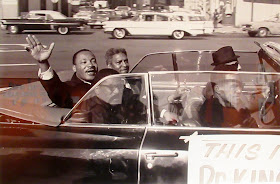'Photographs open doors into the past, but they also allow a look into the future'. Sally Mann
Magnum Manifesto
at Compton Verney.
An exhibition of over 300 photographs chronicling world events of the 20th century.
In 1947, following the aftermath of WWII, four pioneering photographers - Robert Capa, Henri Cartier-Besson, George Rodger and Chim aka David Seymour - founded Magnum photos. For over 70 years Magnum's photographers have documented world events, pushed the boundaries of visual language and fostered photographic dialogues.
Josef Koudelka, Gypsies
Danny Lyon, Conversations with the Dead
In 1967 and 1968, Danny Lyon documented the penal system in Texas. One of these pictures was published in the New York Times, accompanying an article that heavily criticised the living conditions at the prison.
Patrick Zachmann, A survivor of the concentration camps: first worldwide meeting of Holocaust survivors, Jerusalem, 1981
Jean Gaumy, A psychiatric asylum in the town of Soyapango, El Salvador, 1985.
Authorities claimed that millions of Salvadorians were suffering from psychological problems as a result of stress endured during their country's civil war.
Eve Arnold, Migrant Potato Pickers.
In 1951 Eve Arnold compiled a reportage on the migrant workers of Long Island, near New York City. She photographed the daily lives of families employed in the field as potato pickers, producing meditative images in the humanist tradition.
With clever use of contrasts between shadow and light, she endowed her pictures with a universal appeal, combining documentary precision with an intimate, humanist perspectives that invites empathy from the viewer.
Christina Garcia Rodero, Espana Oculta.
Leonard Freed, Black in White America.
Leonard Freed, Black in White America.
Robert Capa, Exiled Republicans being transferred from one part of an internment camp for Spanish refugees to another, Le Barcares, France, 1939
David Seymour, SS prisoners during the Dachau trials, held under the auspices of the Dachau Detachment War Crimes Group, 1947
Wayne Miller, The centre of the atomic 44 bomb blast: a soldier walks through the site where the army barracks previously stood in central Hiroshima, Japan, Sept. 8, 1945
Bruno Barbey, Students forming a chain to pass cobblestones for barricades, rue Gay-Lussac, Paris, May 10, 1968
Raymond Depardon, Lee Evans, winner of the 400 metres, Olympic Games, Mexico City, 1968
Marc Riboud, Jean Rose Kasmir confronting the American National Guard outside the Pentagon during the 1967 anti-Vietnam march, Washington, DC
Constantine Manos, Coretta King and her children around the open coffin of her husband, Martin Luther King, Jr., Atlanta, Georgia, 1968
David Alan Harvey, Norfolk, Virginia, 1967.
In the series
Tell it Like It Is, Harvey photographed a black family living in a disadvantaged neighbourhood, over the course of a month
Danny Lyon, Freedom Day, Selma, Alabama, October 7, 1964
Burt Glinn, Forced integration of Little Rock High School, in formerly segregated Little Rock, Arkansas, 1957
Orval Faubus, governor of Arkansas, had previously mobilised the National Guard to prevent nine African American students from entering the school
Erich Lessing, A woman pulls three heavy sacks through the snow, Budapest, Hungary, 1956
Werner Bischof, Bihar, India, April 1951
Because of flooding and drought, the province of Bihar was heavily stricken with famine
Ara Buler, Saying good-bye on the Galata quay, Turkey, 1955
Wayne Miller, Anti-hydrogen bomb protest, California, 1950
Dennis Stock, Immigrants, New York City, 1950s
Erich Lessing, Hungarian citizens queuing for food and observing destroyed tanks and dead Soviet soldiers after the national uprising against the Hungarian government
David Seymour, A court reporter, judges and members of the Buchenwald concentration camp trial, Dachau, Germany, 1947
Wayne Miller, The center of the atomic 44 bomb blast; a soldier walks through the site where the army barracks previously stood in central Hiroshima, Japan, Sept. 8, 1945
Mark Power, Die Mauer ist weg!
In November 1989, Mark Power was in Berlin when the Wall fell.


































































